How to clear a blocked drain
Have you ever found yourself ankle-deep in water in your shower or watched the toilet rise and overflow? Luckily, some quick-thinking solutions may save you from overflowing wastewater. In this guide, we’ll dive into the murky world of blocked drains and identify some simple ways to clear them.
Got a blocked drain? Try this:
- If it’s a toilet, go straight for the plunger. The pressure you create with a plunger can help dislodge small, superficial blockages.
- For sinks, showers and floor waste, here are a few things to try before you get the plunger out:
- Boiling water
- Baking soda and vinegar
- Drain cleaner
If all these fail, call North West Plumbing a call on 02 4502 8714.
Your drain is designed to take in household wastewater. You wash your hands; flush the toilet; wash the dishes – it all goes through a network of pipes and into the sewage mains and disappears, leaving you with nothing to worry about.
But something unexpectedly clogs up the drain, causing the smooth water flow to come to a halt due to a blockage. And when that happens, wastewater starts to flow back through your showers, sink drains, bathtubs and toilets, which can result in extensive damage to your home.
Things to try to clear a blocked drain in your house
Clearing a blocked drain is frustrating. Try these things if you notice one in your home. But remember to stick to superficial clogs only. Trying to fix anything deeper without the right tools or knowledge can worsen the situation.
Pour boiling water down the drain
Boiling water can effectively dissolve or dislodge minor clogs in the drain pipes. High temperatures can break down grease, soap scum, and other materials obstructing water flow. Boiling water is easily accessible and can make a difference when combined with baking soda and vinegar to dislodge a clog.
Pour a combination of baking soda and vinegar down the drain
Once you have all your materials ready, pour the combination of baking soda and vinegar down the drain. This combination creates a reaction that can help break down organic matter and clear minor blockages at the surface level of the drain. Even if it doesn’t altogether remove the blockage, it might break it down enough for a drain snake or plunger to work more effectively.
Use a plunger to dislodge the clog
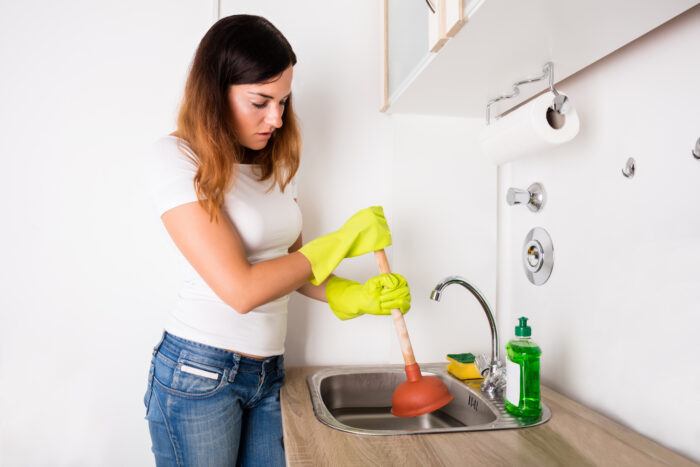
A plunger can be highly effective if the blockage is in a sink, bathtub, or shower is close enough to the surface. The plunger cup should fully cover the drain opening to create a tight seal. This creates the force and pressure needed to dislodge the clog closer to the surface. Wear gloves and protective glasses for safety.
Try a DIY auger tool
Try a DIY auger tool to unclog the drain if the plunger proves ineffective. Follow the instructions of the manufacturer to remove any clogs within reach. Be gentle to avoid damaging your pipes.
If all these steps fail, the clog may be deeper rooted than you initially thought. In this case, you should call a professional plumber who will use advanced tools and technology to clear the clogs without damaging your pipes. In situations where wastewater has overflown already, you’ll likely need emergency plumbing.
What are the common causes of blocked drains?
From hair and soap scum in the bathroom to food scraps and grease in the kitchen, some common and not-so-common culprits wreak havoc in your drainage system. Let’s find out what they are and get advice on some handy tricks to prevent them.
Grease and oils
It’s convenient to dump leftover oils and grease down the kitchen sink, but it’s bound to cause headaches in the long run because of the damage to the drainage system. Grease and oils tend to form a hard layer on the walls of pipes, ultimately restricting and blocking water flow entirely.
Flushable and wet wipes
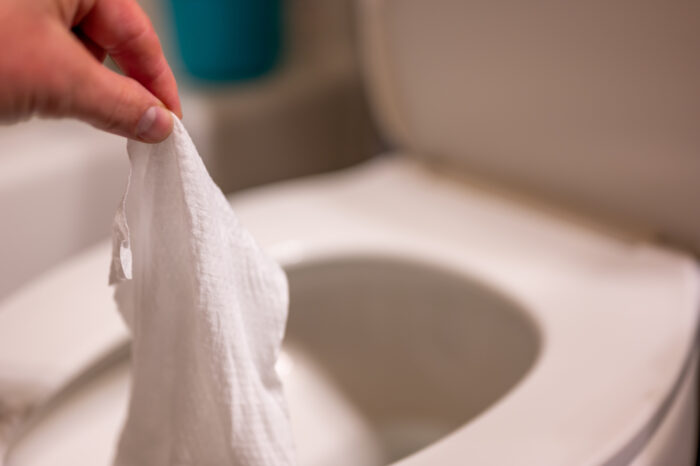
Did you know ‘flushable’ wipes are not that flushable? They DO NOT BREAK DOWN as easily as toilet paper and can quickly line the walls of pipes, causing the water flow to slow down and become blocked eventually. We have to hand it to the marketing teams, though. They did a great job of getting people to believe these wipes would magically disappear like toilet paper.
But those of us who are knee-deep in the madness can tell you that flushable wipes DON’T JUST DISAPPEAR! Sure, they break down – eventually! They just take much longer than regular toilet paper and linger in the sewage system for longer, increasing the probability of a blocked drain. And if that wasn’t enough to convince you, maybe this will. The Australian Federal Court recently fined a company $700,000 for making misleading claims about its flushable wipe brand.
Fatbergs
According to Sydney Water, greasy, matted fatbergs have turned into a 500-tonne-a-year problem, costing over $15 million each year alone.
You’re probably wondering what ‘fatbergs’ even are – they’re large chunks of wipes, fat, grease, oils and other items that do not break down easily, causing harm to local ecosystems and increasing the costs to clean them. Ultimately, all taxpayers and future generations will pay the price of this expensive problem.
Hair
Losing at least 100 strands of hair a day is relatively standard. And while this sounds normal for any household, compound that into multiple people (especially those with long hair) losing that much down the drain. This is when drain problems caused by hair can start to occur.
Hairballs can cause multiple issues, such as blocked drains, slow drainage, foul smells, leaks and floods – made worse in combination with other particles and substances.
Cotton
Cotton can contribute to blocked drains due to its fibrous nature and its ability to clump together when wet. As cotton fibres combine with hair, grease, soap scum, or other debris, they can form a tangled mass in drains, accumulating and turning into a blockage.
Avoid flushing or washing cotton products down the toilet or sink to prevent cotton-related drain blockages. Proper disposal of cotton items in a regular red-lidded bin is recommended.
Tree roots
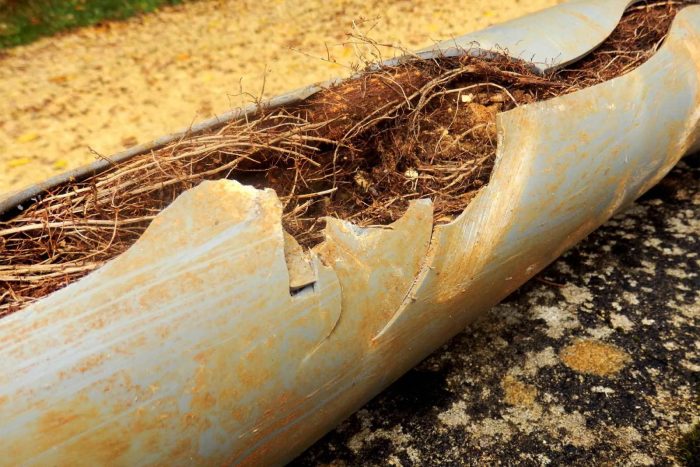
Tree roots naturally seek out sources of water and nutrients, and if there are cracks or joints in underground pipes, they can invade the pipes and grow inside them. Once inside, they grow and expand, causing a partial or full blockage. This can trap debris, grease, or other materials. They can also pressure the pipes, causing cracks to widen and burst – making this a bigger problem than before.
If you suspect tree roots are causing a blocked drain, seek a plumbing professional to inspect the drain and identify the problem quickly before it becomes more significant.
Food particles
Food particles can easily cause drains to block if they are sent down the kitchen sink instead of the regular bins. Over time, these food particles will stick to the walls of pipes or grease will start to harden and combine with other debris going down the drain, causing a build-up that can ultimately result in a blockage.
To prevent this problem, it’s best to use drain guards to catch food scraps and avoid pouring oils and grease down the drain. It’s also ideal to run hot water down the drain after every wash to flush away any food particles that may have the potential to build up in your pipes.
What will a plumber do to clear the blocked drain?
Once the home remedies fail to make their impact, you need to call a plumber for blocked drains and repairs. Here are some of the tools in their arsenal.
A CCTV camera to identify the blockage
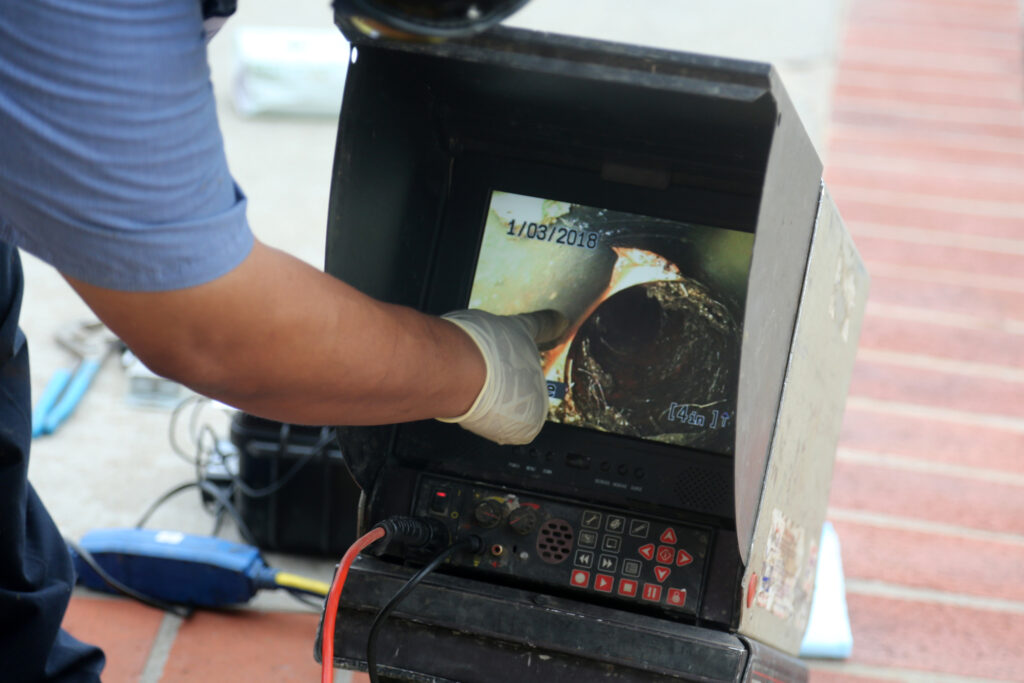
A CCTV camera is an advanced, minimally invasive solution that can help a plumber identify a drain blockage without digging. The camera system is attached to a long, flexible cable inserted slowly into the pipe to find the source of the problem. The camera usually has lighting to illuminate the pipe interiors, allowing for clearer visibility and better image quality. It ultimately provides a clear view, identifying issues such as clogs, tree roots, corrosion, cracks, or other damage-causing plumbing problems.
A CCTV camera has several advantages, including efficient diagnosis and targeted repairs without extensive excavation or exploratory work. Plumbers can accurately assess the pipe and determine the most appropriate course of action quickly and effectively.
High-pressure jetting machines
Once the blockage is identified, the plumber will use other tools to clear the drain. It involves using a specialised machine that generates a powerful stream of water at high pressure. When placed inside the pipe, the machine is connected to a water source to pressurise water. The high-pressure water stream effectively removes blockages by dislodging and flushing away debris, grease, scale, tree roots, or other obstructions that may be clogging the drain. The force of the water breaks apart the blockage and pushes it downstream.
High-pressure water jetting is particularly useful for stubborn blockages that traditional methods don’t easily clear. It is a highly efficient and environmentally friendly technique that minimises the need for harsh chemicals. Remember, high-pressure water jetting has risks, so it’s best for an experienced plumber to handle it.
Other plumbing tools
A plumber can access various tools to dislodge the blockage, including a drain snake, drain cleaners, drain rods and pipe cutters. Each serves a different purpose. For example, using a drain snake, the plumber rotates the cable to navigate through the pipe and dislodge or hook onto the obstruction. But it may only sometimes work. The plumber may try drain rods, which are rigid rods connected to extend their length. They are used to manually push, break up, or dislodge blockages in drains. In some cases, plumbers may need to cut and remove a section of the pipe to access and clear stubborn blockages. Pipe cutters can cut through pipes and remove obstructions.
The choice of tool depends on the nature and severity of the blockage. Plumbers often employ a combination of tools and techniques to clear drains effectively, selecting the most appropriate option based on the situation.
Routine pipe maintenance
Regular maintenance of drains and periodic professional cleaning can also help remove any accumulated debris and prevent clogs and expensive blockages in the future.
In addition to clearing blockages, high-pressure water jetting is also effective for drain cleaning. The forceful water stream scours the inside of the pipe, removing accumulated dirt, sediment, grease, and other build-up, restoring the pipe’s flow capacity and improving overall drainage.
Consequences of ignoring a blocked drain
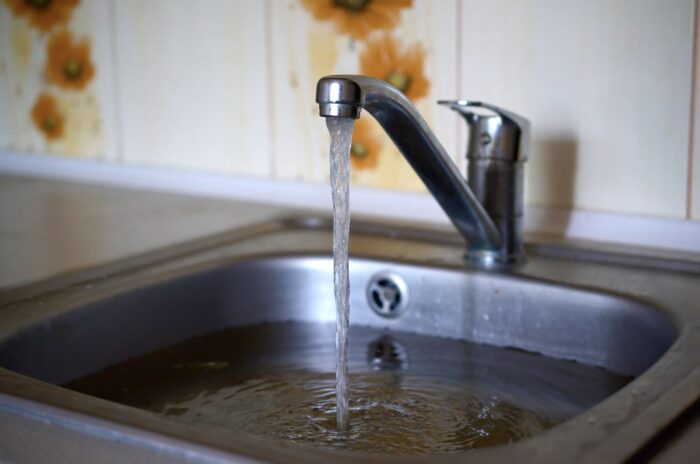
Some warning signs of a blocked drain include water not flowing freely, gurgling sounds, strange smells and water backing up. Ignoring these signs can lead to several negative consequences and potentially escalate the problem.
Overflowing wastewater
Wastewater may have difficulty flowing through a blocked drain. This can result in backups, causing water to overflow from sinks, toilets, or other plumbing fixtures, creating unsanitary and damaging conditions inside or outside.
Pipes cracking and bursting
Blocked drains can put additional and cause pipes to crack, leak, or corrode over time. This can lead to extensive damage to the pipes, requiring costly repairs or even pipe replacement.
Unpleasant smells
A blocked drain can emit foul odours from stagnant water and trapped debris. These smells can engulf the area, making being around the blocked drain uncomfortable and unpleasant.
Structural damage
Overflowing water from a blocked drain can cause damage to walls, floors, and belongings. Structural damage and deterioration can be expensive to repair, so you would want to avoid the problem in the first place.
Pest problems
Water from blocked drains can attract insects and rodents, making your home or office unclean and uncomfortable.
How can you prevent blocked drains in your home?
Prevention is ALWAYS better than cure, and this couldn’t be more true for your plumbing system.
Your first step in prevention is to ensure that nothing unnecessary is flushed down the toilet or shoved down the kitchen or bathroom sink drains. The sewage system isn’t designed to handle anything other than toilet paper, so flushing unnecessary things down will not just cost the government, but homeowners may also be saddled with expensive plumbing bills – a preventable financial burden for all involved.
Use your regular bins for food debris. If you’re in the Hawkesbury council, food debris and scraps go into the red-lidded bin. Penrith Council was one of the first to have introduced the green-lidded food organic garden organics (FOGO) bin, so if you live in this area, all food scraps go into the green bin.
The main idea is to keep your sinks and drains free from food, debris, wipes and other items as much as possible to reduce the risk of a blocked drain in and around your property.
In conclusion
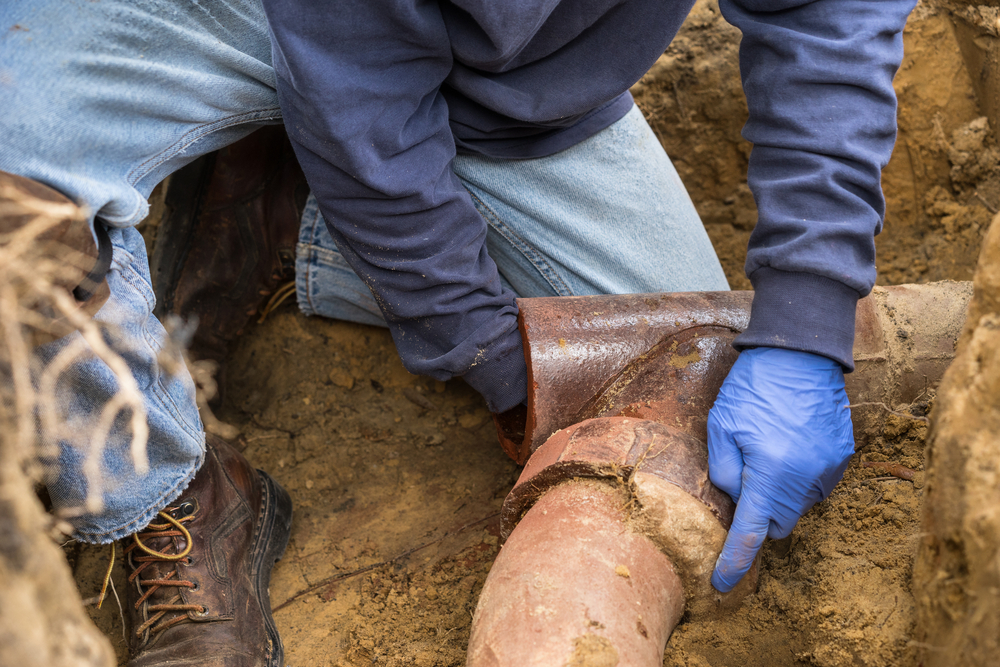
As you can see, blocked drains can become catastrophic when left unchecked. And sometimes, you may do everything right, only to deal with a blocked drain issue anyway. Your first line of defence is to do the 5-step program we have listed above. But if this fails, call your local plumber immediately.
As a trusted Hawkesbury plumber, North West Plumbing and Drainage will get to you quickly, efficiently diagnosing and effectively addressing the problem. We have all the tools and equipment to promptly assess and fix a blocked drain, no matter how deep-rooted the clog is. Call us today.
Look at some of our work to understand what we can do for you.

Jai Simons
Jai is a fully licenced plumber and the owner of North West Plumbing and Drainage. If you need to fix a water leak or unblock a drain, give Jai a call.
Related
About Us
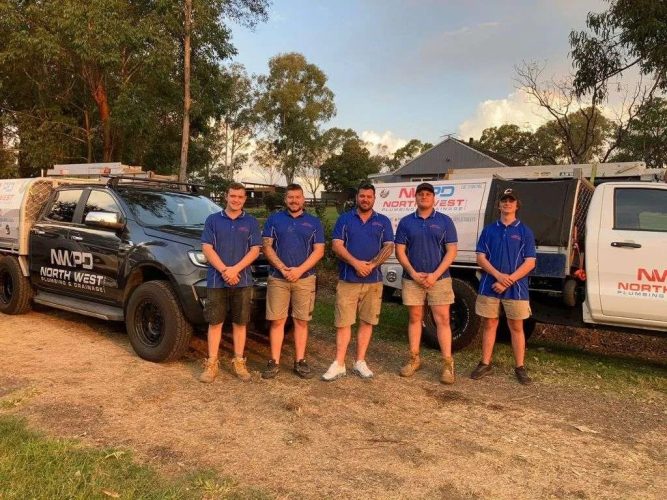
North West Plumbing delivers old-fashioned customer service to our community. We treat our clients the way we would want to be treated – with respect and honesty. All of our services are performed with your best interests in mind. There is no job too small or too tough for us to handle.

